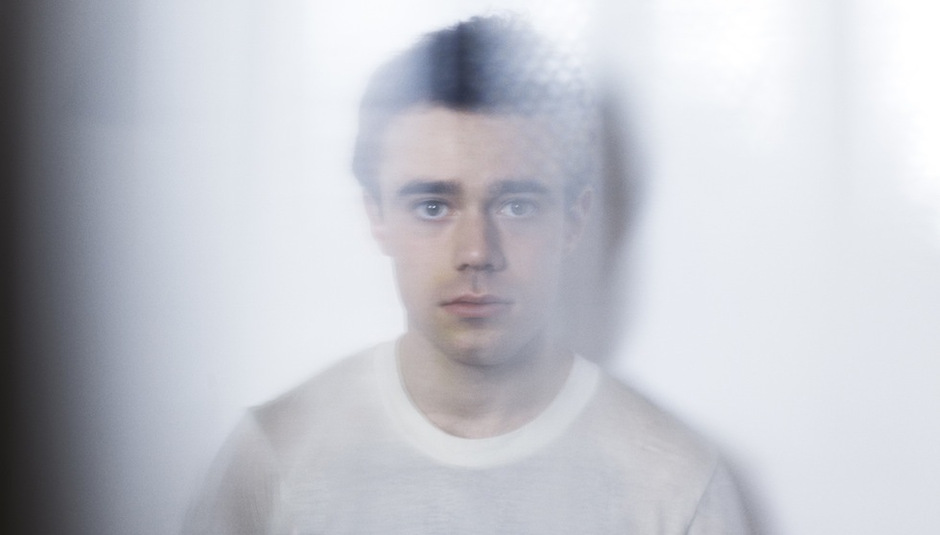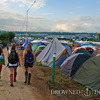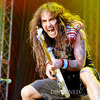“I just didn’t want to rush anything.”
Avi Zahner-Isenberg: singer, songwriter, and master of understatement. The Avi Buffalo frontman - in fact, for all intents and purposes, he is Avi Buffalo - was, to put it bluntly, living the dream about four or so years ago; he signed to Sub Pop, released a self-titled record that had the critics falling over themselves, and toured the world, to further acclaim. I caught one of those shows, at Leeds Festival in 2010; shortly afterwards, he performed the kind of musical disappearing act that Mark Hollis would be proud of.
Avi Buffalo dropped off the radar - hardly unusual of course, as bands so often disappear form the public eye when it’s time to make new music - but their failure to re-emerge as the months passed began to puzzle, even alarm. In the current climate, the pressure to capitalise on any kind of positive exposure with a quick-fire follow-up is significant; for Zahner-Isenberg, it must have been pretty intense. Instead, though, he less shunned the limelight than drifted away from it, with no designs on returning even a minute before he was ready.
With At Best Cuckold, though, the time’s arrived, and all indications are that it’s been four years well spent. It’s a carefully-considered collection of pop songs that represents a bundle of contradictions; it’s both intimate and polished, reassuringly familiar and yet relentlessly eccentric and - perhaps most importantly of all - sounds effortless, despite being such an obvious labour of love. When I spoke to Zahner-Isenberg earlier this summer, he lifted the lid on his extended downtime - resisting interference, retaining creative control and embracing perfectionism, all in the name of protecting his love of songwriting.
JG, DiS: What took you so long?
Avi Zahner-Isenberg: Nothing too dramatic, really. Honestly, there wasn’t much more to it than me taking the time to write a large surplus of songs to choose from, and then figuring out how best to record them.
How far do the songs that ended up on the record go back?
Some of them probably date to when I was eighteen or nineteen, and then there’s some more recent ones that take me right up to twenty-three - I’m twenty-three now. There’s about a five year span, I guess.
How many did you actually end up with, to choose from?
More than I could count, really. There were a lot of songs that were pretty much finished, and then a lot of half-finished stuff that was floating around too; I thought about maybe using some of those as interludes, or something like that. I just kind of narrowed it down, gradually, to the ones that were sounding the most promising over the course of this piecemeal process of recording them. When you start overdubbing and filling in the spaces with sound - when you get to that point where the songs sound close to how they ultimately will, when they’re finished - you begin to get a feel for which ones are really clicking with you, and which ones haven’t quite worked out as you’d hoped.
Was it really as simple as just having a perfectionist approach, then? There wasn’t any post-tour burnout or anything like that?
I guess there was a degree of that. I didn’t want to do what I’d seen other groups do, which was just exhaust themselves because they were struggling to say no to anything. They’d take on too much touring, or agree to make music for other people, or whatever; I’ve seen bands so that, and they end making mediocre music, and you kind of get a sense that they’ve fallen out of touch with their reasons for getting involved in music in the first place. I wanted to take a lot of time to learn, and make sure that I was not only holding onto my roots, but nurturing them too. That seemed like a positive way of maintaining myself, and my musicianship.
How are you feeling now that it’s time to actually put the record out? Is there any sense of anxiety, having been away for so long?
Not really. It’s been a while, but I wouldn’t be putting it out at all if I didn’t feel really good about it. I’ve put together a collection of songs that I’m proud of, and the truth is, I have a real all-or-nothing mindset. There was a little while, initially, where I had to decide if I even wanted to continue doing this at all; I had to find out why I was feeling that way, and let it develop into its own inspiration. Then, there was the everyday effect of, you know, really personal private life stuff that I was going through - relationships, and just generally growing older and maturing. I wanted to let those things inform my writing in a natural way, because they’re natural processes.
Were you thinking about leaving music behind completely?
Oh, no. I would always be making music in some capacity; it was a case of figuring out whether I wanted to continue with this project, and commit myself to everything that goes along with making another record. I had the option to do that, but there were other things I could’ve done, too; I could’ve gone off and been a session player, and paid the bills that way. I mean, when I first started out as a musician, when I was twelve or thirteen, that was always my dream - just to play guitar for other people. Songwriting just became something that I did for fun, to begin with; it wasn’t until later that it became a kind of therapy, a kind of release. That doesn’t come to you unless it’s helping you, in some way.
Does life on the road interfere with that?
Definitely, yeah. There was a point where we were just touring so much that it was difficult to figure things out; you’re never at home, and you’re never grounded, so how can you possibly sit down and write that way? I mean, I did manage to come up with ideas on the road, and I’ll probably continue to do so, but it’s usually a big, big help to be able to just be in your own zone, find some kind of zen and not have to deal with the outside world. You need to get away from all that to be able to work properly, to be able to do what is you.
Did you have any kind of fixed vision in mind for the record, when you were writing?
I knew I wanted to incorporate a lot of sounds that I just wasn’t able to get on my first record; I wanted to open myself up to lots of different tones, and combine the high fidelity and the home recorded. Before I made the first album, I made a lot of demos that were very personal, and often very experimental in the production. When it came to actually recording Avi Buffalo, everything was totally new to me, because i hadn’t put anything down in a proper studio before, in a hi-fi way. As soon as I got in there, a lot of the experimentation kind of disappeared; I just couldn’t make room in the sound for it. I was really rushing through it, and it sounded good, but it didn’t really have that personal edge to it that I had on my home recordings. With this record, I went to a studio and recorded basics on amazing analog equipment, straight to tape, and then overdubbed a lot of it at home, so that I could blend the elements and contrast the sounds. It was super cool to be able to match up what I did with the engineers in the studio with my own stuff - just using interesting things to warm it up and playing around with effects, that kind of thing.
So you felt you were lacking something without that lo-fi, home-recorded sound?
Yeah, I felt like it needed that personal touch. There’s really something about not knowing how you made something that turns out sounding beautiful; those imperfect but interesting sounds really appeal to me. They can make other parts of the record, parts that are very polished and clean, sound even better, because of the way that they contrast and interact with each other. So, yeah, that was a big part of it, finding different weird amps and strange guitar effects, and recording in as many different places as possible.
Different parts of the house, you mean?
Well, that’s the thing; I moved around a lot, these past few years, living between different places and different friends for the sake of cheap rent. The great thing about that was that I’ve been able to record in a bunch of different bathrooms, bedrooms, living rooms, closets, and so on - I even did some stuff outdoors. Plus, being at home, you can really just delve into it any time of the day; I could always ask for somebody’s help, if I needed it, but mostly I’d just fire the record up on Pro Tools whenever I came up with a little idea I wanted to put down. I’d try things out in a way that was totally laid-back and comfortable for me; I could take my time with it, because I wasn’t burning through money for studio time. After that was done, there was probably a year’s worth of overdubbing, just making sure I didn’t add too much or too little; it was really important to me to preserve all the genuine, beautiful, simple things that came with recording analog in the studio, and then contrast that with all the wonders of these softwares that we make music with now.
Was that something that came naturally to you? Are you well-versed in using platforms like Pro Tools?
Oh yeah, totally. I mean, when I was fourteen, the first recording I ever did was through that free software, Audacity, that I downloaded to a PC. I just used a computer microphone to start experimenting with recording and with overdubs; that’s really the very genesis of Avi Buffalo, I guess, as my solo project. Before that, I’d been in another band called Monogram with a friend, where I played drums and guitar; we were super loud and jammy, and we’d try to write by jamming together, but I wanted to see what would happen if I tried to write alone, and experimented with layering. The way in which computers kind of accommodated my curiosity is really what led me into taking songwriting seriously.
Do you feel as if you did anything drastically different with the instrumentation on At Best Cuckold?
Yeah; there was a lot more differentiation in the guitar tones, for one thing. There’s more emphasis on the piano, too. I wrote some more songs in an orchestral way this time around - just messing around with synthesizers to create those kind of effects. There’s definitely a very intensely different focus on drums and drum sounds, as well, and Sheridan (Riley), our drummer, was just coming up with interesting sonic ideas left, right and centre. We also had this terrific multi-instrumentalist onboard, John Anderson, who’s become a really close friend of mine - he played all the bass, and brought a real character to it that I think was missing from the last record. There was just a really intense way of collaborating on the sound of the album, this time; there was a group idea of how the parts would interact, I think.
There’s a real flexibility to your vocal approach too, I think. ‘Think It’s Gonna Happen Again’ is almost like an aggressive falsetto, if there’s such a thing.
Yeah, I think so too. It really just came down to the key that I wrote the songs in, and the way in which the energy of each track would dictate the direction I’d need to head in with my voice. ‘Think It’s Gonna Happen Again’, that song almost has a strain to it, if you know what I mean; there was a dark, minor, kind of rocking menace to it, and vocally, I just ran with how that sounded.
Why did you choose to self-produce the record?
I think, going back to my initial concepts for the project - I mean, the very early stuff, before I’d ever put the album out on Sub Pop - they were very, very big on self-exploration, and I feel like nobody else can ever really understand what you want to do. There’s no real conjunction in that conceptual sense, for me at least. You kind of have to just guide yourself through it, the best you can; it’s not something you can rely on somebody else for, in my eyes. I think I’m definitely a producer type anyway, and I feel like that process involves enlisting a lot of other creative people, but only in ways that I’m comfortable with. I have to be able to pull the reins back, even when it comes to directing myself.
Speaking of Sub Pop, were they cool with you taking your time on the record? Was there ever any kind of pressure from their end?
Never, nothing like that at all. They were awesome, the whole way through. They never demanded anything, or threatened to drop me, or whatever; I think they just intuitively understood that I needed some time to figure out what I was doing, and that it would be worth it when I finished it. I’ve been super lucky, really, because I know that’s not how it is with a lot of labels; a lot of bands that i’ve spoken to have had a much harder time with that kind of thing. It sounds cliched, but it really is like a family there; the way that they work and interact with their artists is just very, very cool. They’re true friends.
How’s the live set-up looking now? Is it any different to last time out?
It’s pretty much the same; keyboards, drums, bass, and me with my guitar. We might bring a second guitarist in - it’d be cool to maybe replicate the album a little more closely - but it’s super fun playing as a four-piece too, honestly; just playing lead and rhythm at the same time, having the bass lock in super solidly with the drums, and bouncing off of each other and sharing in the same energy. Everybody writes parts for the live arrangements based on those interactions, which is really cool.
Are you apprehensive at all about going back out on the road? This must be your first extensive tour for a while.
To be honest, there really isn’t. I think it’s just going to be a lot of fun. We’ve done one-offs here and there, but it’s an amazing feeling to have a big tour coming up, to know you’ll be playing music every night, to see how the songs develop when you make some space for freedom and improvisation, and give them some room to breathe. That’s really what I signed on for in the first place; it’s a big part of why I decided I wanted to do this all over again.
At Best Cuckold is available via Sub Pop on September 8th.
Avi Buffalo tour the UK in October:
3 - The Deaf Institute, MANCHESTER
6 - Broadcast, GLASGOW
8 - Thekla, BRISTOL
10 - Islington Assembly Hall, LONDON























